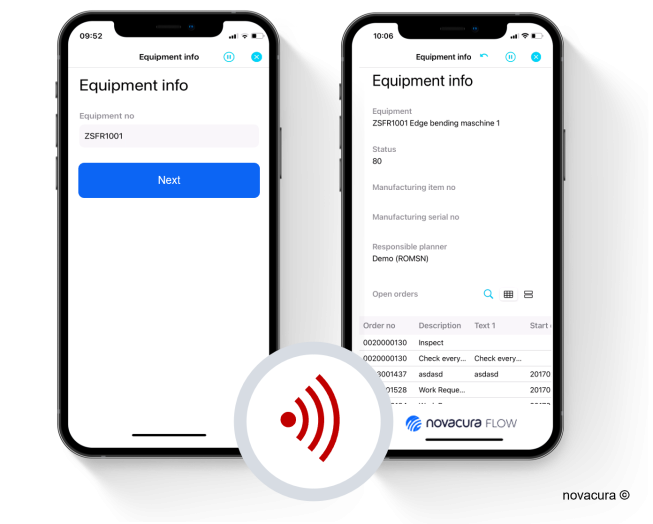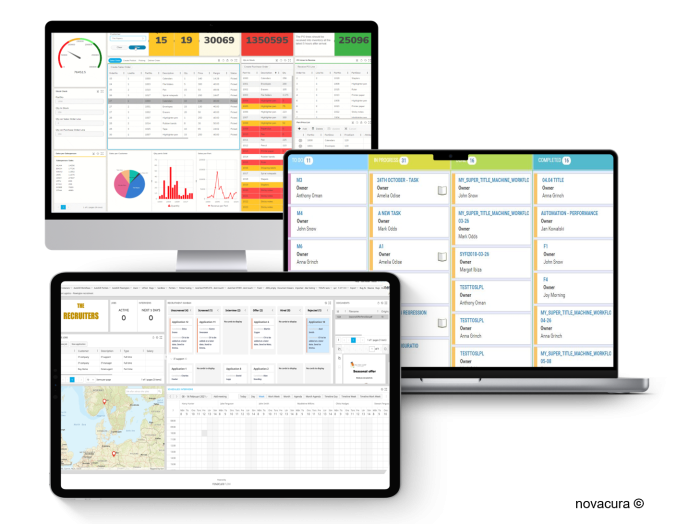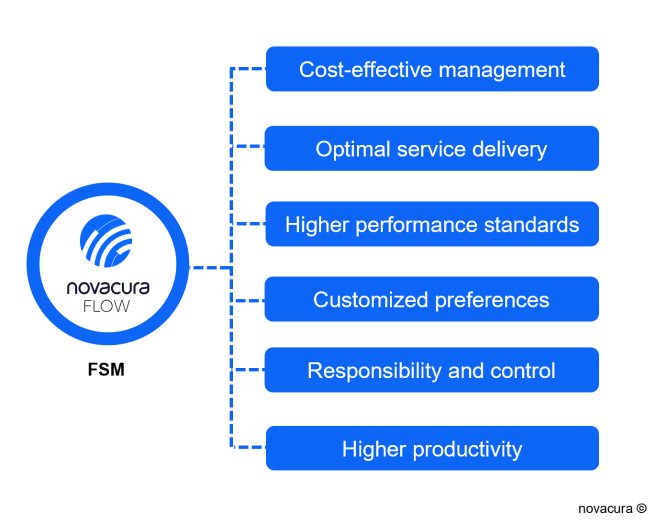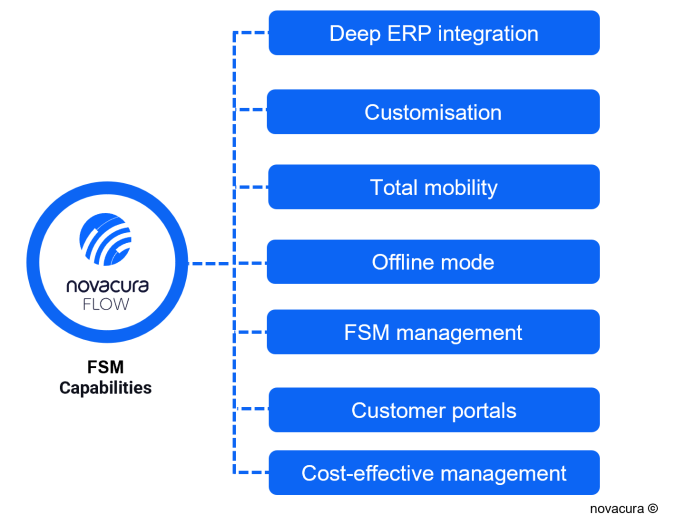
Today, companies that operate in field services and provide maintenance are often closely dependent on ERP systems. However, ERP capabilities are often far beyond the scope of FSM processes, the functionality of which can only be provided by highly customized software for specific business needs. The system transactions in ERP allow the organization run basic operations but does not include the detailed data needed to perform all operations dedicated to FSM effectively. For this reason, field personnel still perform FSM-related tasks with typical paperwork in their hands and then record manually in the ERP system.
Manual data entry causes many discrepancies in the system and delays, which lead to much more serious problems and can have significant financial consequences. In addition, inefficiencies in FSM lead to problems with data flow, which is very important for industries that provide services such as public transport, logistics, energy supply, railway installations maintenance, machinery maintenance in manufacturing, and many others. Only a company with in-house mobile capabilities in the hands of its personnel will be effective enough to deal with the day-to-day business problems associated with field services and maintenance in a highly dynamic environment.
What is field service management software?
FSM software is a system that provides personnel with the capabilities to perform field services and maintenance. Organizations that depend on industrial installations in different locations around the country must often provide services to these installations to ensure their continued functionality. Therefore, the FSM software capabilities should deliver these functions:
- Mobile access: the FSM should provide mobile applications that can be used by field personnel on mobile devices where they can perform checklists, record damages, system functionality faults, and all operations that are needed for their industry-specific equipment and installation requirements.
- Offline mode: organizations that are location-dependent with limited network access should be able to record data on mobile devices that can be updated in the ERP system when the network is available again.

The Novacura app’s has an offline mode. Field workers can retrieve information about the equipment needed for the inspection or reparations and then update the data in the central system.
- System customization: each industry requires a different approach to field service and maintenance, and business requirements can change; therefore, FSM should be easy to adapt when needs increase or system transaction models change.
- Real-time data sharing: the FSM is dependent on remote field staff, but the decision-making process should be centralized; therefore, it is important that the FSM continuously provides real-time data to the central management unit to allocate existing resources better.
- Work order management: the FSM should provide functions accessible from mobile devices that allow easy material pre-order, tool/equipment allocation, process step updates, and even direct access to work instructions with remote assistance.
- Personnel management and scheduling: the FSM should have built-in functionality for allocating various resources and scheduling personnel, which is critical for any field service to provide services in a timely manner and schedule sufficient working hours, as well as prepare a quick replenishment and inform staff when needed.
- Reporting: data collected by field personnel should be continually extracted and evaluated to provide expense calculations and better forecasts.

Customer portals from Novacura are fully customisable and can be tailored to the needs of any business.
- Customer portal: an organization providing field services to outsourcers should ensure that the customer receives real-time updates; therefore, the FSM should include functionality to share data through customer portals to keep operations transparent.
- Optimized interface: the FSM mobile and desktop application for field and administrative personnel should be easy to use to avoid discrepancies in the system; therefore, FSM needs to provide them with an interface with the most relevant functions on the screen.
What are the benefits of FSM software?
Companies that want to ensure that their facilities, equipment, networks, and industrial installations are correctly maintained should consider FSM software, which provides the afore-mentioned capabilities. Having FSM capabilities in-house can bring several direct benefits to their business:
- Cost-effective management: FSM can provide expense assessment tools, so cost-benefit analysis and data accuracy enable companies to prepare more accurate forecasts and calculate ROI.
- Optimal service delivery: FSM provides organizations with commercial benefits in the form of maintenance and field services perceived as optimal resource utilization with data transparency (delivered through customer portals or simply user interfaces in applications).
- Higher performance standards: FSM determines the majority of data accuracy when performing inspections, reducing the workload for personnel.
- Customized preferences: FSM can provide an organization with the ability to customize the system to allow for flexible changes to systems and thereby reduce paperwork.
- Responsibility and control: FSM provides businesses with greater control over the processes. For example, public service companies are better managed and seen as responsible and trustworthy business units. All these companies can gain more customers.
- Higher productivity: companies using FSM can be more productive, as constant control over equipment and installations helps avoid faults, unexpected downtime, and error, as there’s no paperwork in use anymore, etc.

Why use field service management software from Novacura?
FSM software should provide the company with the benefits mentioned above within a single solution that can be customized without costly modifications to the ERP system. Therefore, a company may want to consider software requiring fewer resources to maintain the system and provide all the required FSM functionalities.
Novacura offers Novacura Flow software with FSM capabilities. This software is connected to the ERP system, operating as an additional layer on top of the ERP system, enabling easy data exchange. Based on a low-code platform, Novacura Flow allows the development of mobile and desktop applications dedicated to FSM without advanced programming knowledge.
The example presented above explains how users can use Novacura Flow, with access to Novacura Flow Studio, environment for developing applications for internal operational needs in warehouses.
Novacura Flow provides businesses with these FSM capabilities:
- Deep ERP integration: Novacura Flow can be connected to well-known ERP systems such as SAP, IFS, Oracle, and Infor, sharing real-time data across the organization and quickly streamlining day-to-day operations.
- Customization: Novacura Flow software is based on a low-code platform, which enables the development of customized mobile and desktop applications to meet all FSM requirements. This allows additional system transactions to be implemented without modifying the ERP system, increasing business opportunities.
- Total mobility: Novacura provides mobile and desktop apps as work order management that completely meets the requirements of FSM, from the material requisition and communication with personnel to tracking all field operation and maintenance activities.
- Offline mode: Novacura Flow FSM solutions provide the ability to work in a non-networked environment, allowing field personnel to freely perform all service and inspection tasks using their mobile devices. At the same time, data will be updated in the systems automatically when the network is available again.
- FSM management: Novacura Flow provides workforce management and scheduling for service and maintenance operations in the field.

- Customer portals: Novacura Flow’s FSM solution allows for the development of customer-dedicated portals, providing insight into the company’s operations and transparency to the customers, which increases trust between organizations.
Summary
Novacura Flow provides the most suitable FSM solution for various industries. Companies can benefit from it at no extra cost arising from later modification needs, ensuring the best quality and high performance. Novacura streamlined companies’ operations to be as efficient as possible regarding field service and maintenance.
Customer case
Learn more about FSM implementation from Novacura in Anticimex, leading company that operates in facilitates management sector.

Novacura has been providing its solutions to industries worldwide for almost 20 years. During this time, we have grown our network to more than 220 business customers in the US, Australian and European markets. Our customers use Novacura Flow as an FSM solution to support and streamline their day-to-day operations. Contact us today and see how you can cost-effectively streamline your operations. Learn more about FSM from Novacura here.









